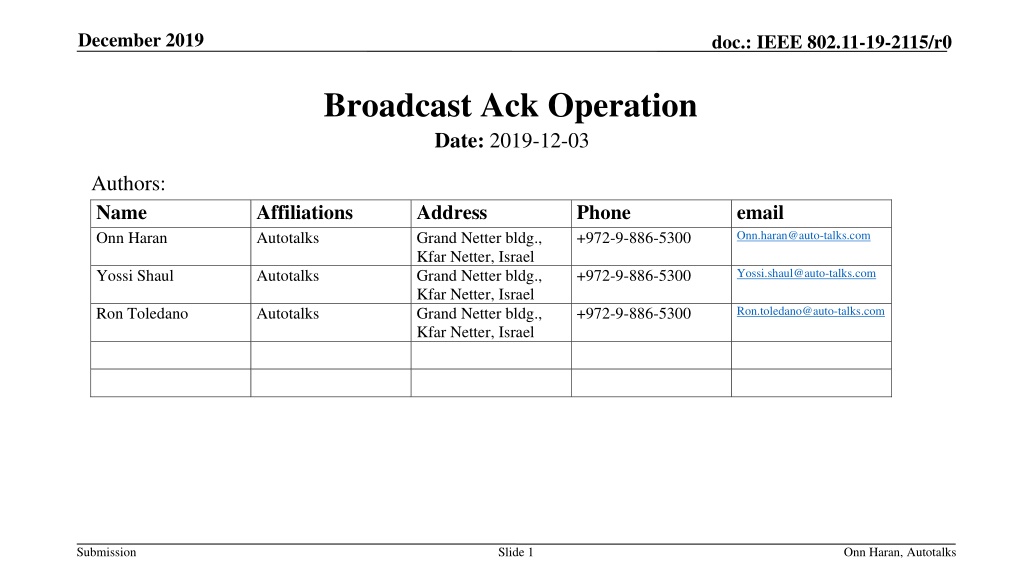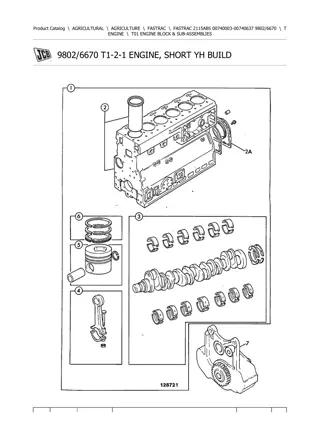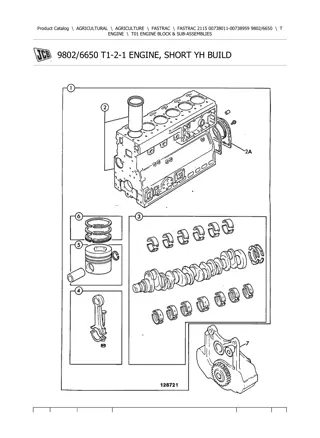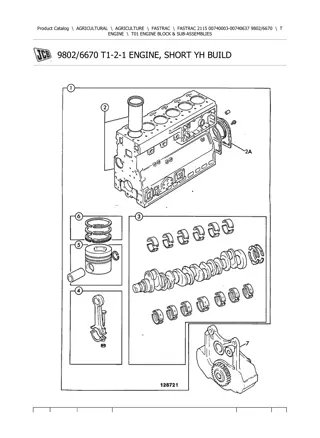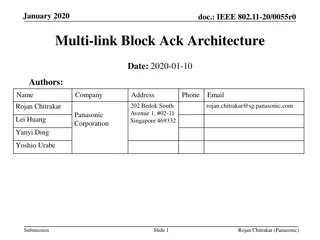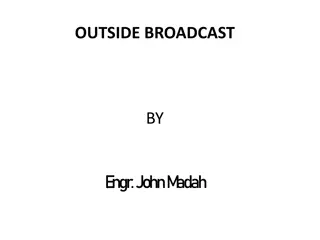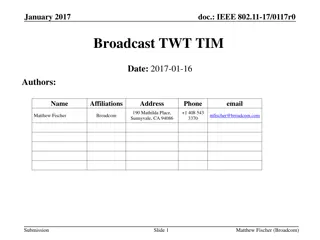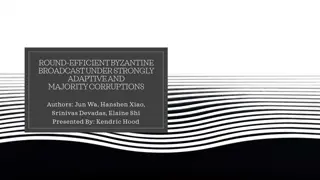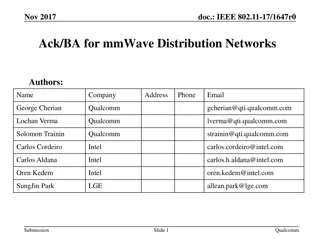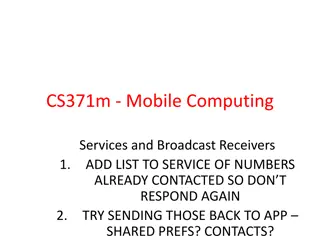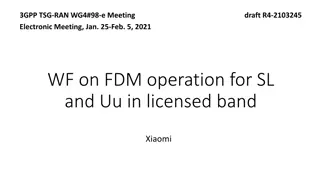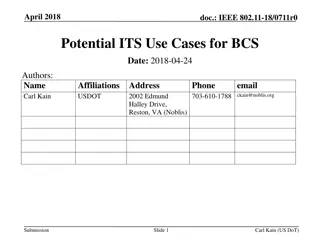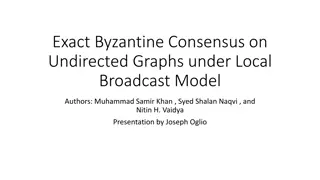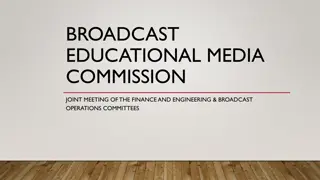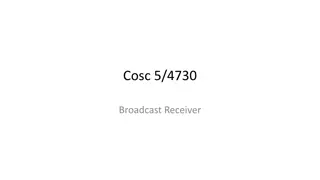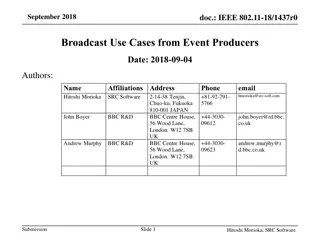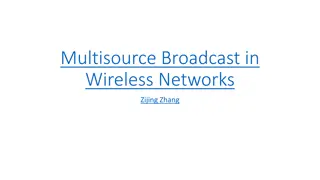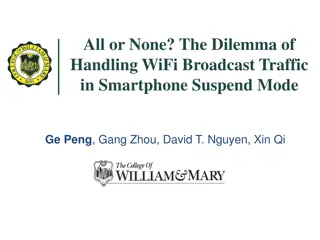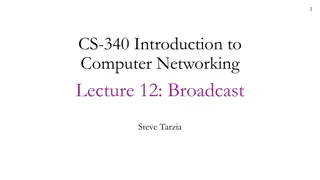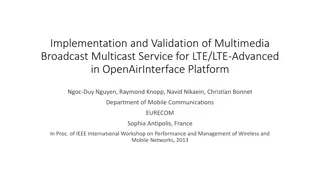Enhancing Broadcast Operations in IEEE 802.11 Networks
This document discusses the benefits of incorporating broadcast operations alongside groupcast in IEEE 802.11 networks, emphasizing the importance of assured message delivery for scenarios like Left Turn Assistance and Crossing Pedestrian alerts. It also proposes eliminating setup and teardown processes for efficient scaling to All-to-All negotiations, along with predefined parameters and flexible capability support alternatives. The naming convention suggestions aim for clearer representation of dedicated messages.
Download Presentation

Please find below an Image/Link to download the presentation.
The content on the website is provided AS IS for your information and personal use only. It may not be sold, licensed, or shared on other websites without obtaining consent from the author.If you encounter any issues during the download, it is possible that the publisher has removed the file from their server.
You are allowed to download the files provided on this website for personal or commercial use, subject to the condition that they are used lawfully. All files are the property of their respective owners.
The content on the website is provided AS IS for your information and personal use only. It may not be sold, licensed, or shared on other websites without obtaining consent from the author.
E N D
Presentation Transcript
December 2019 doc.: IEEE 802.11-19-2115/r0 Broadcast Ack Operation Date: 2019-12-03 Authors: Name Onn Haran Affiliations Autotalks Address Grand Netter bldg., Kfar Netter, Israel Grand Netter bldg., Kfar Netter, Israel Grand Netter bldg., Kfar Netter, Israel Phone +972-9-886-5300 email Onn.haran@auto-talks.com Yossi.shaul@auto-talks.com Yossi Shaul Autotalks +972-9-886-5300 Ron.toledano@auto-talks.com Ron Toledano Autotalks +972-9-886-5300 Submission Slide 1 Onn Haran, Autotalks
December 2019 doc.: IEEE 802.11-19-2115/r0 Is Broadcast Needed? Only Groupcast? Groupcast assures delivery within group: platooning, negotiation Groupcast (many-to-many) Multicast (one-to-many) Broadcast assured delivery is valuable as well, for example: Left Turn Assistance: A vehicle driving straight would benefit from assured delivery to a vehicle on opposite road about to turn left Crossing pedestrian: Assured delivery of cooperative perception message to vehicles approaching the pedestrian Assuring Broadcast delivery requires similar effort to Groupcast delivery, so why not adding the value and flexibility? Some modifications are needed any way Submission Slide 2 Onn Haran, Autotalks
December 2019 doc.: IEEE 802.11-19-2115/r0 Setup and Teardown Should be Eliminated to Scale to All-to-All Negotiation X X Submission Slide 3 Onn Haran, Autotalks
December 2019 doc.: IEEE 802.11-19-2115/r0 Pre-agreed Parameters Parameter Policy Possible values Immediate / Delayed Single recipient message (BlockAck): Immediate Multi-recipient message (if added): Sequenced 0-1023 1 Only content of most recent message is relevant. No reason to acknowledge older messages Pre-agreed value Buffer size The same parameters should be applied by all supporting devices without negotiation Submission Slide 4 Onn Haran, Autotalks
December 2019 doc.: IEEE 802.11-19-2115/r0 Capability Support Alternative #1: Mandatory All NGV devices would be required to respond to BlockAckReq Delivery can be always assured Alternative #2: Optional A bit in NGV MAC header indicates BlockAckReq support Flexible Alternative #2 is recommended Submission Slide 5 Onn Haran, Autotalks
December 2019 doc.: IEEE 802.11-19-2115/r0 Naming Convention A unique name should represent the dedicated messages Block is a bad term since only a single message is acknowledged Suggesting BroadcastAck BroadcastAckReq BroadcastReq BroadcastAckReqMR (Multi-Recipients) Submission Slide 6 Onn Haran, Autotalks
December 2019 doc.: IEEE 802.11-19-2115/r0 Multiple Requests Multiple requests are sent to the stations Reminder: stations are identified by upper layer Retry when a single station failed to acknowledge After retry No need to send requests to stations previously acknowledged BroadcastAckReq Broadcast / Groupcast BroadcastAckReq Originator Recipient #1 BroadcastAck Recipient #2 BroadcastAck Submission Slide 7 Onn Haran, Autotalks
December 2019 doc.: IEEE 802.11-19-2115/r0 BroadcastAckReq Format Octets 2 2 6 6 2 2 4 Frame control BAR control BA Duration RA TA FCS information 4 8 Bits 1 1 1 2 7 4 Starting sequence number Fragment number Ack policy Multi-TID Compressed GCR mode Reserved TID 0 Value 0 0 0 10 0 0 Unused combination Submission Slide 8 Onn Haran, Autotalks
December 2019 doc.: IEEE 802.11-19-2115/r0 BroadcastAck Format Octet 2 2 6 6 2 3 4 Frame control BAR control BA Duration RA TA FCS information Value Octet 2 1 Starting sequence number As in 1 bit reports last message from TA, either Broadcast or Groupcast Bitmap BlockAckReq Submission Slide 9 Onn Haran, Autotalks
December 2019 doc.: IEEE 802.11-19-2115/r0 Adjustment to Requested Feedback from Multiple Recipients From 10.24.3 Data and acknowledgement transfer using immediate block ack policy and delayed block ack policy If an immediate block ack policy is used, the recipient shall respond to a Basic BlockAckReq frame with a Basic BlockAck frame. If the all recipients sends the Basic BlockAck frame, the originator updates its own record and retries any frames that are not acknowledges in the Basic BlockAck frame, either in another block or individually Submission Slide 10 Onn Haran, Autotalks
December 2019 doc.: IEEE 802.11-19-2115/r0 Multi-Recipients Request Each handshake wastes BlockAckRequest duration and SIFS Latency further increases by repeated wait for channel access Combining BroadcastAckReq into a single message minimizes channel load A sequence of up to 8 (TBD) STAs respond sequentially at pre-determined time points BroadcastAckReqMR Broadcast / Groupcast Originator Recipient #1 BroadcastAck 2*SIFS+ packet duration 3*SIFS+ 2*packet duration BroadcastAck Recipient #2 Recipient #3 BroadcastAck Other STAs NAV Submission Slide 11 Onn Haran, Autotalks
December 2019 doc.: IEEE 802.11-19-2115/r0 BroadcastAckReqMR Format Octets 2 2 6 6 2 2 4 Frame control BAR control BA Duration RA TA FCS information Broadcast / groupcast 48 4 8 3 Bits 1 1 1 2 7 4 Number of recipients Address recipient #1 Starting sequence number Fragment number Ack policy Multi-TID Compressed GCR Reserved TID 0 Value 0 0 0 11 0 0 Unused combination Submission Slide 12 Onn Haran, Autotalks
